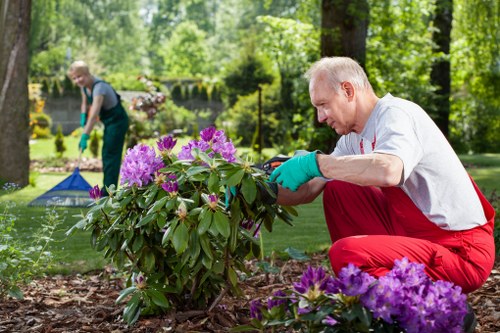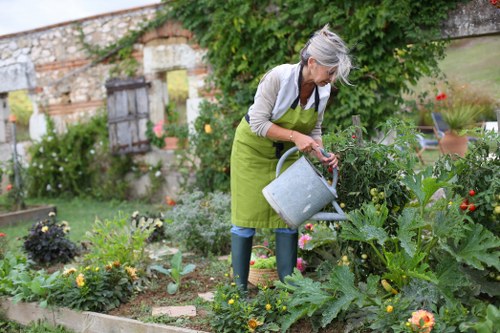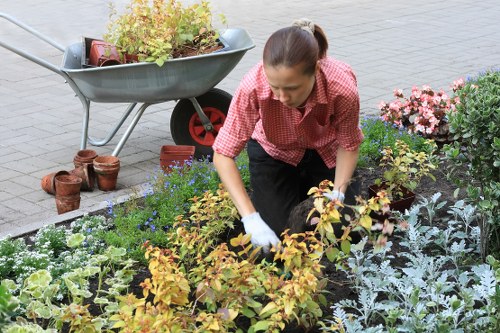Garden Maintenance in Middle Park
Introduction to Garden Maintenance

Maintaining a beautiful garden in Middle Park requires dedication, knowledge, and the right tools. Whether you're a seasoned gardener or a beginner, understanding the unique aspects of gardening in this area can help you achieve a lush and vibrant outdoor space.
Middle Park offers a diverse climate that influences the types of plants that thrive here. From the rich soil to the moderate rainfall, gardeners have a variety of conditions to work with. Proper garden maintenance ensures that your plants remain healthy and your garden remains an attractive retreat throughout the year.
In this guide, we will explore the essential aspects of garden maintenance in Middle Park, including seasonal tasks, plant selection, soil care, pest management, and more. By following these tips, you can create and maintain a garden that not only looks stunning but also contributes to the local ecosystem.
Seasonal Garden Maintenance

Seasonal changes play a significant role in garden maintenance. Each season presents its own set of challenges and opportunities for gardeners in Middle Park.
Spring: Spring is the time for planting new flowers and vegetables. It's essential to prepare your soil by adding compost and mulch. Pruning dormant trees and shrubs can also encourage healthy growth.
Summer: Summer requires consistent watering, especially during heatwaves. Regular weeding and pest control are crucial to prevent damage to plants. Providing shade for sensitive plants can help them thrive during the hotter months.
Plant Selection for Middle Park Gardens

Selecting the right plants is fundamental to successful garden maintenance. Middle Park's climate supports a wide range of plant species, but it's important to choose those that are well-suited to the local conditions.
- Perennials: Plants that come back year after year, such as lavender and hostas, are excellent choices for long-term garden design.
- Annuals: These plants complete their lifecycle in one season, providing vibrant color and variety. Petunias and marigolds are popular options.
- Vegetables: Growing your own vegetables like tomatoes, peppers, and lettuce can be rewarding and sustainable.
Incorporating native plants can also benefit the local ecosystem by providing habitat for pollinators and other wildlife.
Soil Preparation and Care

Healthy soil is the foundation of a thriving garden. Proper soil preparation involves testing the soil's pH, adding necessary amendments, and ensuring proper drainage.
Soil Testing: Conducting a soil test helps determine its pH level and nutrient content. Based on the results, you can adjust the soil by adding lime to raise pH or sulfur to lower it.
Composting: Adding compost enriches the soil with organic matter, improving its structure and fertility. Regularly incorporating compost into your garden beds enhances plant growth and resilience.
Pest and Disease Management

Protecting your garden from pests and diseases is crucial for maintaining plant health. Implementing integrated pest management (IPM) strategies can help manage infestations effectively.
- Monitoring: Regularly inspect plants for signs of pests or diseases. Early detection allows for prompt action.
- Biological Controls: Introducing beneficial insects, such as ladybugs and praying mantises, can naturally reduce pest populations.
- Mechanical Controls: Physical barriers like nets and traps can prevent pests from reaching your plants.
- Chemical Controls: As a last resort, use eco-friendly pesticides to address severe infestations without harming beneficial organisms.
Maintaining good garden hygiene by removing dead plant material and debris also helps prevent the spread of diseases.
Irrigation Techniques for Efficient Water Use

Efficient water management is essential for garden maintenance, especially during dry spells. Implementing effective irrigation techniques can conserve water and ensure that your plants receive adequate hydration.
Drip Irrigation: Drip systems deliver water directly to the plant roots, minimizing evaporation and runoff. This method is highly efficient and reduces water waste.
Mulching: Applying mulch around plants helps retain soil moisture, suppress weeds, and improve soil temperature regulation.
Pruning and Trimming for Plant Health

Regular pruning and trimming are vital for maintaining the shape and health of your plants. Proper pruning encourages healthy growth, removes dead or diseased branches, and enhances the overall appearance of your garden.
- Timing: Different plants require pruning at specific times of the year. Understanding the optimal pruning schedule for each plant ensures effectiveness.
- Techniques: Using the right pruning techniques prevents damage and promotes better growth. Clean cuts and the correct angle are essential.
- Tools: Maintaining sharp and clean pruning tools reduces the risk of spreading diseases and makes the process more efficient.
Regular pruning also helps improve air circulation, reducing the likelihood of fungal infections and other plant diseases.
Weed Control Strategies

Weeds compete with your garden plants for nutrients, water, and sunlight, making effective weed control essential.
Implementing a combination of mechanical, chemical, and cultural weed control methods can help manage weed growth:
- Manual Weeding: Regularly removing weeds by hand ensures that they do not have a chance to establish and spread.
- Mulching: As mentioned earlier, mulch suppresses weed growth by blocking sunlight and creating a barrier.
- Herbicides: Use selective herbicides to target specific weed species without harming your garden plants.
Maintaining a well-maintained garden with healthy, dense plant growth naturally reduces the opportunity for weeds to establish.
Fertilization for Optimal Growth

Fertilizing your garden provides essential nutrients that support plant growth and development. Understanding the nutritional needs of your plants helps you choose the right fertilizers and application methods.
- Types of Fertilizers: Organic fertilizers, such as compost and manure, improve soil health over time. Synthetic fertilizers offer quick nutrient boosts but should be used sparingly to avoid soil degradation.
- Application: Apply fertilizers according to the specific needs of your plants. Avoid over-fertilizing, which can lead to nutrient runoff and environmental harm.
- Timing: Fertilize during the active growing season to maximize nutrient uptake and support robust plant growth.
Regular soil testing can help determine if your garden requires additional nutrients, ensuring your plants receive the care they need.
Composting and Soil Health

Composting transforms organic waste into valuable soil amendments, enhancing soil structure and fertility. Creating a compost pile in Middle Park can reduce household waste while providing your garden with nutrient-rich compost.
Materials: Use a mix of green materials (kitchen scraps, grass clippings) and brown materials (leaves, straw) to create a balanced compost.
Maintenance: Regularly turn the compost pile to aerate it, promoting decomposition. Keep the pile moist but not waterlogged to accelerate the composting process.
Integrating Native Plants

Incorporating native plants into your garden supports local biodiversity and reduces maintenance efforts. Native species are adapted to the Middle Park climate, requiring less water and being more resistant to local pests and diseases.
- Benefits: Native plants provide habitat and food for local wildlife, including pollinators like bees and butterflies.
- Low Maintenance: These plants typically require fewer inputs, such as water and fertilizers, making them easier to care for.
- Resilience: Native species are more resilient to local weather conditions, ensuring your garden remains lush even during adverse weather.
Choosing a variety of native plants can create a balanced and sustainable garden ecosystem.
Creating a Sustainable Garden

Sustainability in garden maintenance involves practices that minimize environmental impact while promoting long-term garden health.
Water Conservation: Implementing efficient irrigation systems and using drought-resistant plants reduces water usage.
Organic Practices: Using organic fertilizers and pest control methods supports a healthy ecosystem and reduces chemical runoff.
Biodiversity: Planting a diverse range of species enhances resilience against pests and diseases, promoting a balanced garden environment.
Tools and Equipment for Garden Maintenance

Having the right tools and equipment simplifies garden maintenance tasks and ensures they are performed efficiently.
- Hand Tools: Essential hand tools include trowels, pruners, and gloves, which are necessary for various maintenance tasks.
- Power Tools: Depending on the size of your garden, power tools like lawn mowers, trimmers, and blowers can save time and effort.
- Watering Systems: Installing irrigation systems, such as drip lines or sprinklers, can automate watering and ensure consistent moisture levels.
Regular maintenance and proper storage of tools extend their lifespan and keep them in good working condition.
Local Gardening Resources in Middle Park

Access to local gardening resources can greatly enhance your garden maintenance efforts. Middle Park offers a variety of nurseries, garden centers, and community groups that provide support and information.
Joining local gardening clubs or attending workshops can help you learn new techniques and stay updated on best practices. Additionally, local extension services can offer advice tailored to the specific conditions of Middle Park.
Gardening Tips for Year-Round Maintenance

Maintaining a garden year-round requires a proactive approach and continuous care. Here are some tips to keep your garden thriving throughout the seasons:
- Regular Inspections: Frequently check your plants for signs of stress, pests, or diseases, addressing issues promptly.
- Seasonal Planting: Adjust your planting schedule to align with the changing seasons, ensuring plants have the best conditions to grow.
- Proper Mulching: Maintain a consistent layer of mulch to protect the soil and retain moisture.
- Adapt to Weather: Be prepared to adjust your garden maintenance practices based on weather forecasts and unexpected changes.
By staying attentive and adaptable, you can enjoy a beautiful garden throughout the entire year.
Nearby Areas to Middle Park for Gardening Services

Middle Park is surrounded by several nearby areas that offer excellent gardening services. These areas are conveniently close, making it easy to access professional help and resources for your garden maintenance needs.
- Northwood: Located just 2 miles north of Middle Park, Northwood is known for its lush gardens and experienced landscapers.
- Greenfield: Greenfield, 3 miles east, offers a variety of nurseries and garden centers with a wide selection of plants.
- Brookside: To the south, Brookside provides comprehensive garden maintenance services, including lawn care and pest management.
- Sunnyvale: Sunnyvale, 4 miles west, is renowned for its sustainable gardening practices and eco-friendly services.
- Maple Grove: Maple Grove, 5 miles northeast, specializes in ornamental gardening and landscape design.
- Oak Hill: Situated 6 miles northwest, Oak Hill offers expert tree care and pruning services.
- Riverside: Riverside, 2.5 miles southeast, features excellent irrigation and water management solutions.
- Elmwood: Elmwood, 3.5 miles southwest, is popular for its organic gardening supplies and composting services.
- Pinecrest: Pinecrest, 4.5 miles east, provides a range of pest control and plant protection services.
- Willowbrook: Willowbrook, 5.5 miles west, offers personalized garden planning and maintenance packages.
Conclusion

Effective garden maintenance in Middle Park involves understanding the local climate, selecting appropriate plants, and implementing sustainable practices. By following the guidelines outlined in this article, you can create a thriving garden that enhances your outdoor space and contributes to the overall beauty of the community.
Remember to utilize local resources, stay proactive with seasonal tasks, and embrace eco-friendly gardening methods. With dedication and care, your Middle Park garden will flourish year-round.
Contact us today to schedule your garden maintenance service and take the first step towards a stunning and sustainable garden in Middle Park.
